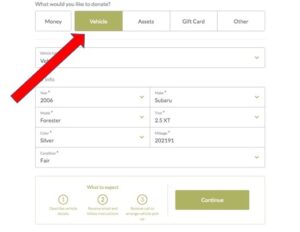I arrived at the car repair shop hopeful, only to get the dire news. The total repair for my 2006 Subaru Forester would cost $3,300. The Kelley Blue Book value? Well, let’s say that the cost of repairs far exceeded the total value of my beloved Subaru.
What to do?
As I started shopping for a new car, I asked the dealership what my car would be worth on trade in. The salesperson said it would only be worth $500–$1,000. “What? That’s it?” I asked myself.
To add insult to injury, when the time came for trade in, the dealership only offered me $250 when it came time to trade it in. “Can’t you sell it for parts and get at least $1,000?”
So, rather than trading my old car for a new one, I decided to donate my car. I’ve never donated a car before–but I’ve been encouraged to consider it several times by National Public Radio.
I dove in and decided to donate it to the work of Denver Institute. I thought it would be a complex process, but it took me less than 5 minutes.
Here’s how to donate your car to DIFW:
1. Fill out the vehicle donation form.
Go to the Give page on our website and click on the tab that says “vehicle.” Fill out the information about your car and click Continue. On the next page, you’ll fill out your address and contact information. After that, you’ll receive a confirmation email.

2. Schedule a pick-up time for your car.
Within 48 hours, you’ll receive a call from a company that will pick up your car; simply schedule a convenient time for them to pick up your car.
3. Smile.
That’s it! You’ll clean out the stuff in your glove compartment, sign the title, and leave the keys for pick up. The company will then auction off your car and the amount they receive at the auction will be donated to the charity. When that’s complete (usually in less than a few weeks), you’ll receive a tax-deductible receipt through our partners at iDonate for the amount you ultimately donated to DIFW.
Our family budget is tight. But rather than selling my car to a car dealer, marking it up and then reselling it (and receiving a fraction of the value in the process), donating your car is easier than selling it privately and benefits a cause you care about.
I’m biased, of course, but one of those causes is building a network of Christian leaders who can impact our culture with the gospel. For my wife and me, it was a pleasure to turn old metal parts into kingdom impact.

